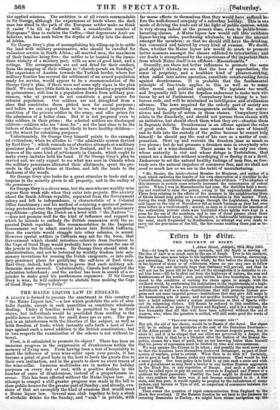THE MAINE LIQUOR LAW IN ENGLAND.
A LEAGUE is formed to procure the enactment in this country of "the Maine Liquor law,"—a law which prohibits the sale of alco- holic liquids, except in such quantities as constitute wholesale dealing. Under it families would be permitted to lay in their stores, but individuals would be precluded from sending to the public-house or the tavern for small doses pro re nata. The pro- ject is an interference with the liberties of the subject, as well as with freedom of trade, which instantly calls forth a host of feel- ings against such a novel addition to the British constitution; but in two respects the examination of the scheme is not without in- terest.
First, is it calculated to promote its object ? There has been an immense progress in the suppression of drunkenness within the memory of living men. From having been a test of hospitality to mark the influence of your wine-cellar upon your guests, it has become a point of good taste in the host to leave the guests free to their own inclination, and in the guests to show no overt traces of the wine-cellar. Immense multitudes are in motion for holiday purposes on every day of rest, with a positive decline in the number of cases of drunkenness, instead of a proportionate in- crease. This has been effected without the Maine liquor law. An attempt to compel a still greater progress was made in the bill to close public-houses for the greater part of Sunday ; and already, eva- sions of that act exemplify the kind of evasions that would meet a Maine liquor law. Several men club together to buy a stock of alcoholic drinks for the Sunday, and " soak " in private, with
far worse effects to themselves than they would have Suffered be- fore the well-dressed company of a suburban holiday. This is one mode of driving the trade out of the light of public opinion, which is very strong indeed at the present time, even in public-house- haunting classes. A Maine liquor law would call into existence liquor-buying clubs, purchasing wholesale, to share the amount amongst the members; so that we should still have the drinking, but concealed and tainted by every kind of evasion. We doubt, then, whether the Maine liquor law would do much to promote better manners amongst the classes addicted to intoxication ; and our doubt is strengthened by the experiences of the important State from which Maine itself is an offshoot—Massachusetts.'
Secondly, are there not better influences to promote the same good object ? Already we see that the love of approbation, the sense of propriety, and a healthier kind of pleasure-seeking, when called into active operation, constitute counteracting &ices against drunkenness. It is probable that the fundamental principle of free-trade applies to this as well as to many other moral and political subjects. We legislate too much, and frequently fall into the hopeless endeavour to make men vir- tuous by act of Parliament. Compulsory laws belong to a bar- barous code, and will be minimized as intelligence and civilization advance. The laws required for the orderly part of society are enabling laws, permitting arrangements suitable to the conve- nience and facility of action in those classes. Compulsory laws relate to the disorderly, and should not pursue those classes with an initiative, but should check them when they err—chastise them in flagrante delicto. Drunkenness is an offence against the rules of good order. The drunken man cannot take care of himself, and he falls into the custody of the police because he cannot help himself : he should pay the cost of his care as a matter of com- pensation. Shut up and restrain the drunken :man as much as you please; but do not presume a drunken man in everybody who can look at a wine-decanter. There seems to be only one class, whose maturity is riot and whose dotage is Teetotalism, that cannot see a decanter without worshiping it or fleeing it as a devil. Endeavour to set the natural healthy feelings of men free, as free- trade sets the natural impulses of commerce free, and we shall not need so much law as we are in the habit of manufacturing.
* Mr. Baxter, the lately-elected Member for Montrose, and author of a book which embodies the results of his own observation as a traveller in the United States, contributes valuable matter-of-fact evidence. "The adoption of i
this measure n certain cases actually increased the consumption of ardent spirits. When I was in Massachusetts last year, the distillers held a meet- ing and resolved to raise the prices owing to the unprecedented demand. Three facts relating to the effects of the measure in the neighbouring State of Rhode Island may guide us to a correct conclusion in this matter. First, during the week following its passage through the Legislature, firms who sold liquor in the city of Providence did as much business as they had ever done before in a twelvemonth ; second, as soon as it received the sanction of the authorities, private clubs were instituted where spirits were kept in a press for the use of the members, and to one of these presses alone there were three hundred keys ; third, at Newport, a fashionable bathing-place on the coast, much frequented by Southerners, no attempt was ever made to carry out the provisions of the bill, the bar-rooms existing there just as be- fore."


























 Previous page
Previous page